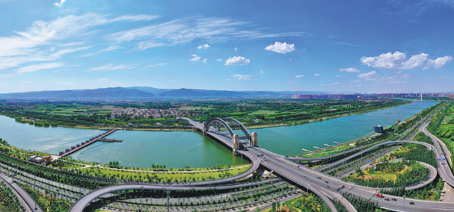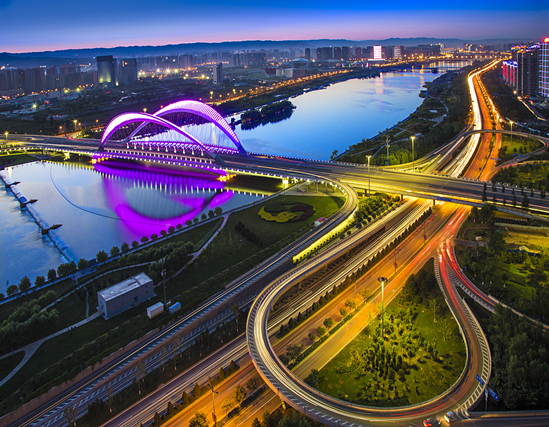River improvements give region new lease of life
Updated: 2022-10-14

The scenic belt along the Jinyang Bridge section of the Fenhe River is a new tourist attraction in Taiyuan. [Photo by Li Zhaomin for China Daily]
The Fenhe River, the second-largest river in Shanxi province, is now once again the pride of residents as it continues to nurture local lives and bring more environmental benefits.
Stretching 713 kilometers and with a drainage area of 39,721 square kilometers, the Fenhe is the second-largest tributary of the Yellow River, which is the second-longest river in the country and considered China's "mother river".
In turn, the Fenhe is the "mother river" of Shanxi, nurturing the region with thousands of years of history in farming.
However, because of overuse of water, a decrease in vegetation coverage and industrial pollution, the river lost its historical glamor several decades ago.
Wang Xiaoyan, a resident of Taiyuan, said she still remembers her early impressions of the river.
She recalled that about two decades ago, living near the river was unpleasant.
"No one liked to walk along the river," Wang said. "The Fenhe was a dry river for the majority of the year. And it had an unpleasant smell for the rest of it."
Changes began to take place in the late 1990s, when cities like Taiyuan launched environmental improvement projects for the river, with local authorities focusing their efforts on pollution control and increasing water supply to the river.
Shanxi began to improve the entire river in 2017. It focused on increasing water supply and improving its ecological environment.
A water diversion project starting from the Wanjiazhai Dam, on the upper reaches of the Yellow River, began to supply water to the Fenhe that year, with water lifted by several pumping stations and diverted to the Fenhe River at its source in Ningwu county.
According to Tian Xiaojun, an engineer in charge of the first pumping station in Wanjiazhai, the water diversion project has supplied about 118 million cubic meters of water to Fenhe during the first seven months of this year.
"In addition to the Fenhe, the Sanggan River in Datong, which is upstream of the Yongding River in Beijing, is also a recipient of the Yellow River water through the Wanjiazhai project," Tian said.
Feng Zhijun, chairman and Party chief of Wanjiazhai Water Group, said the Wanjiazhai project was initially designed to supply water to Shanxi's major cities for industrial and household use.
He said Wanjiazhai has supplied 2.8 billion cu m of water to Taiyuan alone over the two decades since the project became operational in 2002.
"The Yellow River water has not only increased the runoff of the Fenhe, but also helped to improve the river's water quality," Feng said.
A monitoring station at the Fenhe's estuary shows steady improvement in the water quality of the river year-by-year.
Since June 2020, water quality rated below Class 4 has never been recorded at the station. The 2022 statistics show the rate of Class-3 water quality reached 52.4 percent.
Class 4 is the standard for water that can be used by industries and Class 3 is for water that can be used for irrigation and aquaculture.
As a result of efforts to increase water supply and improve the environment, the Fenhe has once again become a scenic river with a pleasant environment.
Chen Xiaoli, another Taiyuan resident, said she enjoys walking along the river in the evening, especially the Jinyang Bridge section. Jinyang Bridge, featuring two rainbow-shaped arches, has become a landmark on the river and one of the top attractions in the city of Taiyuan since its construction in 2019.
"It is especially beautiful in the evening when the lights are on and the rainbow arches are reflected on the clear water of the river," Chen said.
The Fenhe, nurtured by the Yellow River, eventually empties itself back into the Yellow River at the village of Miaoqian in Wanrong county.
The estuary in Miaoqian is now a popular site for photographic drone operators. It features the convergence of the crystal-clear Fenhe and the yellow water of the larger river, as well as a vast span of wetland that offers habitat to a large number of birds and other animals.
Cheng Guoyuan, Fan Zhen and Ding Yuan contributed to this story.



